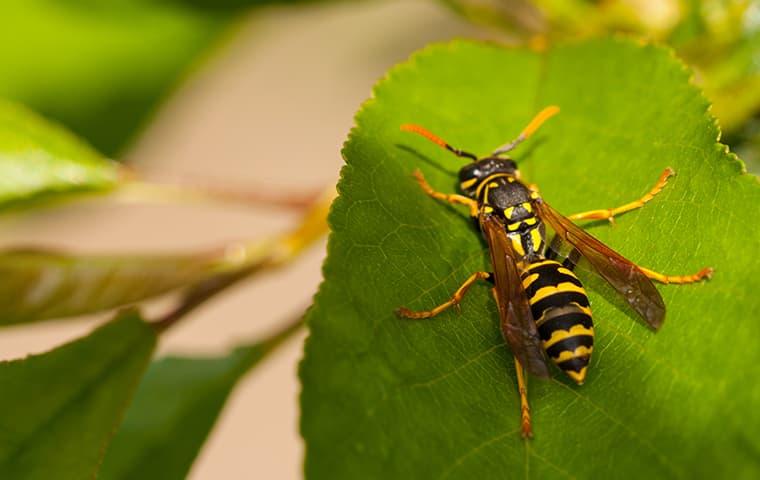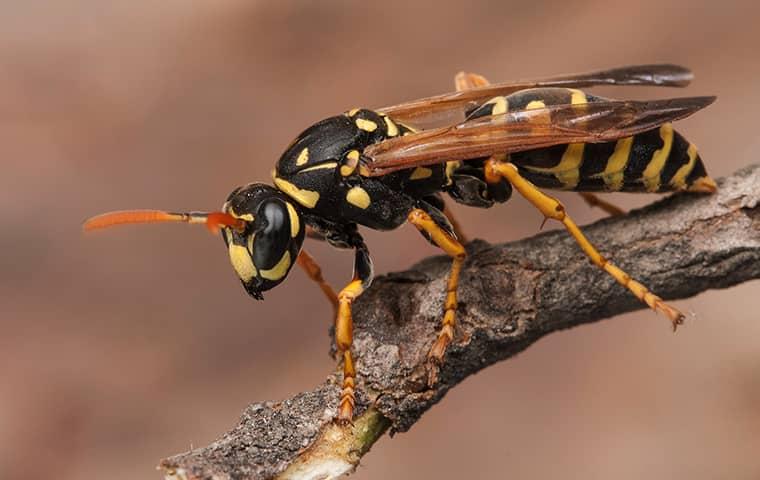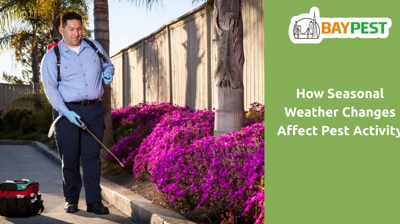Comprehensive Guide To Wasp Control In The Bay Area

It is a beautiful sunny day, and you are relaxing on your front porch. The breeze is just the right temperature. The birds are singing. All is right with the world. All is right until you start noticing a random wasp checking out your siding and soffits. You track it with your eyes, watching as it checks out every gap and opening. You watch it until it crawls into a gap and doesn't come out. That's when uneasiness turns into frustration. Do you have a nest in there? If so, what on earth can you do about it? You can't exactly douse it with a can of wasp begone. Have you experienced this scenario or one like it? It is all too common in the Bay Area. Today, we're going to arm you with the information you need to deal with wasps around your home. We'll look at when wasps are active, what different types of wasps you'll see on your property, and what they're doing out there. We'll give you effective tips to reduce wasp activity and prevent wasps from stinging you. We'll also tell you what service professionals do to prevent wasp problems. If you already have a wasp problem and want to know the best way to get rid of a wasp nest by yourself, this is not the blog for you. We don't recommend DIY wasp nest removal. There are far too many things that can go wrong. For nest removal or general wasp pest control in the Bay Area, contact Bay Pest for assistance. Trust us when we say that it is best to let an experienced professional deal with wasp nests. With that said, let's take a look at wasp prevention.
Wasp Activity Never Seems To Stop Around The Bay Area

The temperatures in the Bay Area can stay warm enough to allow wasps to remain active all year long. But we often get a bit of a reprieve during the winter months when temperatures drop down and it gets rainy and chilly. But, as soon as winter is behind us, you're going to start seeing the occasional wasp exploring the exterior of your home. Those are female wasps looking for a place to call home. Where will she create her home? It depends on the wasp species in the Bay Area.
Paper Wasps: These are usually reddish wasps with yellow legs. They may also appear yellow and black, like a yellow jacket. Paper wasps typically create paper nests on exterior walls and underneath roof overhangs. But they can also create nests in structural voids, like the spaces in the siding of a porch or roofline.
Yellow Jackets: These are small, yellow and black wasps that gravitate to landscaping. They always create their nests in voids, but they aren't limited to structural voids; they'll create their nests in ground holes as well. However, they aren't digger wasps; they need holes that already exist.
Hornets: There is a bit more confusion with hornets than with other stinging insects. First, hornets are wasps. They're just a special kind of wasp. One way they're special is that they have sentries that fly around their nests. When a sentry detects danger, it can activate the nest and create a swarm. So, it is best to deal with hornet nests quickly.
Mud Daubers: These wasps are quite a bit different from the other wasps listed here. The others are social insects that swarm. Mud dauber wasps are solitary insects and do not gather into a swarm to protect their nests. The primary issue with solitary wasps is that you can accidentally sit on one or come in contact with them in other ways.
What can you do about these wasps attempting to build nests inside structural voids, ground holes, or on your exterior? You can prevent wasps from building in voids by removing the holes. You can stop yellow jackets simply by filling in ground holes. Keeping wasps out of structural voids is a bit trickier. We recommend hiring a contractor to use expanding foam to seal every little gap they can find.
These methods work to prevent nest creation in hidden places, but what about nests that are right out in the open? If you inspect your exterior routinely during the early spring, you can catch starter nests and remove them before they become a problem. A starter nest looks like a little paper blob. Wait until the middle of the day to remove these because wasps are active during the day, and you can sweep or wash that little blob away while the queen is out gathering materials and the nest is empty.
But you don't have to wait until wasps attempt to create nests on your property to do something about those stinging pests. Let's look at "why" wasps create nests on properties and what you can do to deter them.
Wasp Prevention 101: How To Minimize Wasps Around Your Home
What are wasps looking for in your yard? You probably have some ideas. But we would be willing to bet that you only know a fraction of what is going on inside a wasp's mind. Here are the reasons wasps hang out around your home and what you can do about it.
Nectar: It is likely that you know that wasps eat nectar. If you have lots of flowers, you can expect to have lots of wasps visiting your home. One way you can reduce wasp activity is to remove flowers you don't need. What flowers don't you need? Look out at your lawn. Do you see any flowering weeds? You can start with those. Weeds are the first food source wasps detect as they enter your property.
Bugs: Wasps are protein eaters. If you have lots of insects and multi-legged critters, you'll have lots of wasps. The two go hand-in-hand. You can reduce insects by keeping exterior lights off. Light attracts insects. You can reduce spiders, centipedes, millipedes, and other multi-legged critters by addressing moisture. Repair gutter brakes and remove clogs to help with moisture control.
Trash: Another way wasps get protein is by getting into trash receptacles. Make sure all of your receptacles have covers. It is important to also keep receptacles clean. Wasps often create nests above receptacles because the scent rises and is a reminder that food is near.
Wood: Paper wasps gather their paper material from decaying wood sources. If you have stumps, logs, campfire wood, construction materials, dead branches, an old fence, decaying boards on your back deck, or some other source of wood, you'll have more issues with paper wasps. Remove these wood sources or store them in covered containers.
There is no way to remove all of what wasps are looking for on your property, but you can reduce the attractants and reduce wasp activity. It is best to proactively prevent wasp nests because nest removal is a pain. Literally, let's quickly look at some of the ways DIY nest removal can go wrong.
Why Homeowners Shouldn't Try To Face Wasps On Their Own
We pointed out above that nest removal is the best way to deal with wasps in early spring, but we don't recommend removing a nest that is no longer in the initial stages. If you go after an active nest, you may get unexpected results.
- The products used to destroy wasp nests are harmful to children and pets. Keep this risk in mind.
- Control products applied to wasp nests on structures sometimes send wasps deep into wall voids, and they come out inside the home.
- Attacking a social wasp nest immediately aggravates the wasps, and they will pour out of their nest with one thing on their minds: Defend the nest. The result? Lots of stings.
- When removing a nest, you may have to go into a closed space, such as a garage. The number of stings can increase when things get out of hand in an enclosed area.
- When using a ladder or hanging out a window, accidents happen.
- If you are successful in destroying one nest, it won't keep you from having another – and another.
The best way to deal with a developed wasp nest is to let an experienced service technician use professional-grade equipment and field-tested methods to remove the nest. A professional can also help you after the nest is gone.
Reduce Your Risk For Stings With Professional Stinging Insect Control
After you've paid for yellow jacket control or paper wasp nest removal, what comes next? The best way to prevent nests and wasp stings is through proactive inspections and early wasp nest removal. If life is busy and you need help, a year-round pest control plan is a great option. Year-round residential pest control comes with routine service visits. During visits, your service technician will look for trouble and deal with wasp nests that are developing. Contact Bay Pest for a pest control service plan that gives you general protection from all types of wasps in the Bay Area. We deal directly with wasps and also address the pests wasps eat. Want to learn how it works? Call or write. We'd love to guide you in finding the right pest control for your Bay Area home. We're here to help.

Pest Control with a Personal Touch
Why Our Service Makes the Difference
-
Results-Driven
Unlimited follow-ups for 30 days after each service ensures optimal results.
-
Customizable ServiceWe customize the service and frequency to meet your Pest Control needs.
-
40+ Years of ExperienceWith over 40 years of experience, we're your best bet for Pest Control in the Bay Area.
-
Licensed, Insured, Vetted ProsEntrust your pest control needs to licensed, insured professionals.

A member of our team will be in touch shortly to confirm your contact details or address questions you may have.

Hear From Our Happy Customers
At Bay Pest Solution Inc, your satisfaction is our priority! See for yourself what our customers have to say about working with us.
-
"Great job handling pest removal!"
I would recommend Bay Pest Solution to everyone! They have done a great job handling all our pest removal issues. I'm always ...
- Denise S. -
"Friendly, punctual, thorough service"
So glad to be customers of Bay Pest Solution Inc.! They are very friendly, punctual, and thorough. Despite many other pest ...
- Alivia D. -
"Fantastic service, very professional."
As a real estate professional in the Bay Area, Bay Pest Solution Inc. is my go-to for anything pest-related. Fantastic ...
- Calmin C. -
"Full Satisfaction"
Would definitely work with them again in the future.
- Ross W. -
"Extremely Happy"
Their price on it was good and no contract.
- Ronald B. -
"Professional & Honest"
Bay Pest was the first to listen and very quickly gave me options on termination.
- Cindy B. -
"Very Knowledgeable"
Good communication, timely, friendly, great follow-up.
- Carter C. -
"Service Was Great"
Easy communication, friendly and helpful and they got the job done in one go.
- Charity S.



.png)
.2504210754032.jpg)

